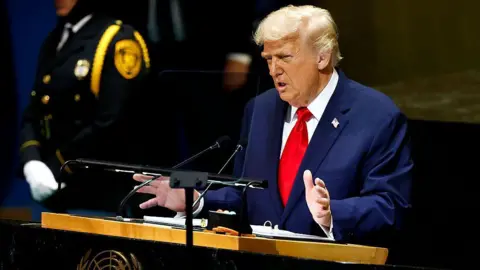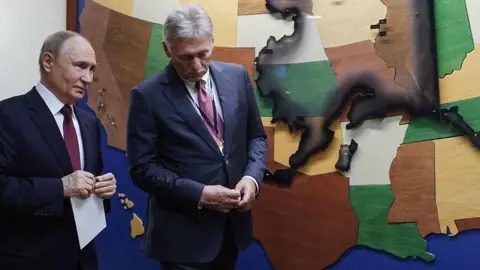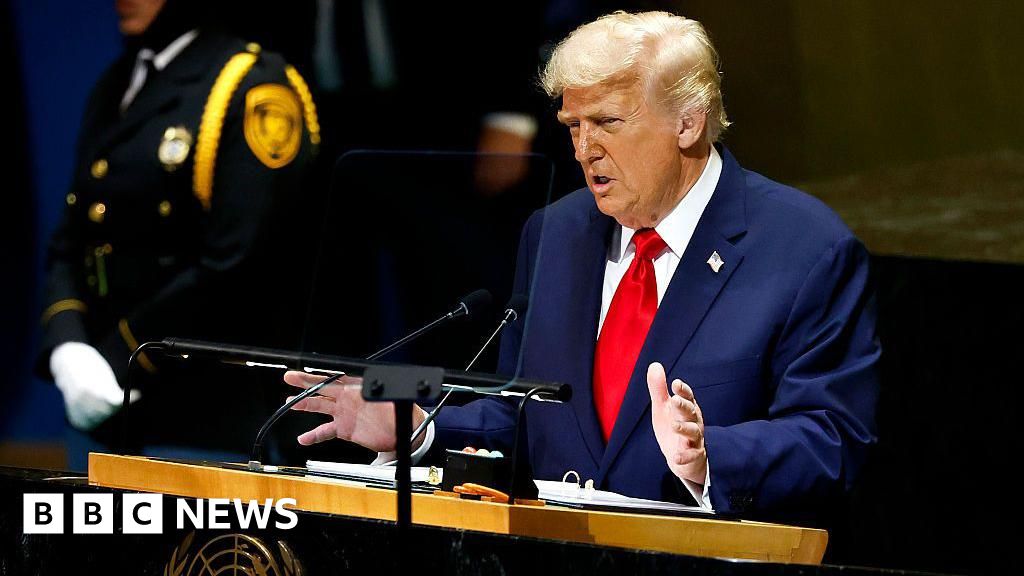Steve RosenbergRussia editor in Moscow
 Chip Somodevilla/Getty Images
Chip Somodevilla/Getty ImagesOn paper, there was plenty in Donald Trump’s comments to rile the Kremlin.
For starters, his description of Russia as a “paper tiger” that had been “fighting aimlessly” in Ukraine.
Moscow won’t like that.
I remember when President Barack Obama described Russia as a “regional power”, as opposed to a global one: that was taken as a big insult here.
President Trump’s suggestion that Ukraine could win back all the territory Russia had seized will have raised eyebrows, too, in Moscow.
And Russian eyebrows will have shot up even higher after Trump’s reply to a reporter’s question.
“Do you think that Nato countries should shoot down Russian aircraft if they enter their air space?” the reporter asked.
“Yes, I do,” replied Trump.
Yet the Kremlin’s initial response to all of this has been rather restrained.
Vladimir Putin’s spokesman Dmitry Peskov gently brushed aside the “paper tiger” insult.
“Russia’s in no way a tiger,” Mr Peskov to a Russian radio station. “It’s more associated with a bear. And there is no such thing as a paper bear.”
What of the suggestion that Kyiv could retake lost territory?
“The assertion that Ukraine can win back something by fighting is mistaken,” the spokesman told reporters later.
On a Kremlin conference call for journalists, I ask Dmitry Peskov for his reaction to Trump’s comments.
“Russia, in general, and President Putin in particular value highly President Trump’s political will to continue working towards a peace settlement,” Peskov replies.
Very diplomatic.
Then again, we’ve seen this before.
So often when Trump posts or voices unexpected criticism of Russia and/or of Putin, the Kremlin takes a deep breath and responds with something a little calmer, more restrained than we might expect.
But why?
Today’s edition of the Izvestiya newspaper suggests the first reason.
“It’s important to remember that Trump is influenced by the last person he has spoken to,” wrote Izvestiya. “In this case it was Zelensky.”
In other words, Moscow believes that Donald Trump’s views on Ukraine are not set in stone and that he can be persuaded to come round to Russia’s view.
“We will have the opportunity to convey our position to the American side,” Peskov tells me. “Our foreign minister Sergei Lavrov can do this. He’s meeting his counterpart [US Secretary of State Marco Rubio] in New York on the sidelines of the United Nations General Assembly.”
 GAVRIIL GRIGOROV/POOL/AFP
GAVRIIL GRIGOROV/POOL/AFPThere may be another reason why Russia doesn’t feel the need to shout back.
President Trump’s comments, as critical as they were of Russia, contained no threat of additional sanctions; no ultimatum to Moscow; no deadline to make peace, or face the consequences.
The Kremlin will have noted that.
What’s more, when asked by a reporter whether he still trusted Vladimir Putin, Trump replied:
“I’ll let you know in about a month from now.”
A month is a long time in war and politics. I doubt the Kremlin will be quaking in its clogs over such an answer.
But what about the threat to shoot down Russian aircraft?
The Kremlin’s response: denial.
“We hear the hysteria about our military pilots allegedly violating rules and somebody’s air space,” Peskov tells me. “But all these claims are groundless and without proof.”
Trump also painted a picture of a Russian economy in dire trouble.
The Kremlin denied that, too.
But what is the state of Russia’s economy?
It’s not collapsing. But it is creaking. Perhaps that’s not surprising after more than three years of international sanctions and massive state spending on the war.
Russia’s budget deficit has been growing, revenues from oil and gas falling. Many branches of industry have been struggling.
The recent spate of Ukrainian drone attacks on Russian oil refineries has affected domestic fuel supply. Even in what is a highly controlled media landscape, Russian newspapers have been reporting petrol shortages in some parts of the country.
“Russia is on the verge of a full-scale fuel crisis” declared tabloid Moskovsky Komsomolets last month.
There’s no sign, though, that economic pressures are influencing the Kremlin’s calculations on the battlefield.
For now, Vladimir Putin seems determined to push on with the war in Ukraine.
No matter what Donald Trump may say about that.


